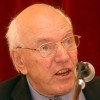Guest Blog: Religion and Violence
by - 6th January 2015

CONTEMPORARY commentators in the press constantly use social scientific data but they nearly all ignore social scientific ways of understanding contentious issues, most obviously when it comes to issues of religion and violence.
As busy people they fall back on standard narratives derived from the French enlightenment about the irrationality of religion, and its proper confinement to the private sphere.
These narratives include assumptions about the malign tendency of religion to violence, and these are taken to be obvious to any informed person. Yet from a social scientific point of view all human activity is implicated in violence.
The selection of a single factor as a special scapegoat, to carry the (assumed) moral disgrace of implication in violence is just one of the innumerable simplifications of complicated questions. Such dangerous simplifications excuse abuse of religious people, and of Christians, Jews and Muslims in particular.
Shocking
The ‘New Atheists’ provide particularly shocking illustrations of how we are all chronically prone to identify a malign ‘other’ as the source of all that is wrong or regressive.
Unfortunately many modern Christians, for good Christian reasons to do with repentance and reconciliation, accept the contemporary abuse of Christians for what earlier generations did to each other and opponents.
Yet it makes no scientific sense for a modern Christian to apologise, either for crusaders sacking Jerusalem or Venetians sacking Byzantium.
Major thinkers identify a critical historical period in the first millennium BC when human understandings, especially in Buddhism and Christianity, developed a marked reserve towards naked symbolisations of power and wealth, and of the forces of nature.
Islam lacks this reserve, as numerous incitements to warfare in its sacred scriptures indicate.
Honour codes
The default position in history manifests a struggle for survival, written biologically and culturally, whereby human solidarity is expressed in antagonism between ‘Us’ and ‘Them’, manifested in honour codes and mutual terror.
There is nothing unusual about ISIS. Just read the history of Baghdad or of the pagan Mongols and the Mamluk Muslims. We can assume the continuous internecine struggle for dominance, whereas the emergence in human speech of discourses, rejecting violence and the territorial imperative (the claim to a homeland) is the surprising development.
Social scientists are very wary of statements claiming that a dubious entity ‘religion’ typically does this or does that. Instead we need to understand the kind of template for human interaction in the economic, political, erotic and aesthetic spheres, generated by a radical reserve towards power, wealth, tribal solidarity and hierarchy.
We need to understand the surprising creation of non-violent fraternities and sororities across all borders that break into the social imperatives of generational continuity and territorial claims.
This surprising creation includes mutual recognition, restitution, redemption, forgiveness and reconciliation. It inaugurates the dialectic of grace and the law, and of inwardness and external conformity. It sanctifies martyrdom and the voluntary embrace of poverty on the model of the divine self-emptying of Christ, and treats as exemplary his substitution of service for domination.
Human ‘nature’
All this runs so counter to the default model of aggrandisement that it imposes enormous strains on human ‘nature’ to the point where institutions emerge for those who seek Christian perfection, as distinct from those who accept and manipulate the structures of power embraced by the established Church (as in contemporary Russia). This institutional bifurcation becomes increasingly acute once Christianity is adopted as the cement of empire to be embraced by the majority, including male elites remote from the females to whom Christianity initially most appealed.
This bifurcation expresses itself in Christian iconography: the lowly maiden Mary becomes a great Lady, the potent protector of great cities, and the Holy Father as the good shepherd becomes a great temporal Lord. The political realism of Machiavelli confronts the critique of power, wealth and corruption deployed by Dante.
The next step in the argument is so obvious that its neglect requires explanation in terms of the seductive simplifications of ‘enlightened’ narratives. Once Christianity is adopted by structures of power, the power-holders revise the radical template to accommodate the justifications appropriate to imperial, feudal, enlightened autocratic, or capitalist societies. Absolute monarchies have a predilection for King Solomon while Protestant nationalism models itself on an aggressive New Israel ‘under God’.
Hierarchical militarism
New Viking Christians, forcibly incorporated in Christendom for political reasons, do not go to Sunday school to learn about little Jesus meek and mild. Christianity is recast heroically as an expansive and hierarchical militarism. That requires no explanation, whereas we need to explain the insertion in society at large of a different discourse of reconciliation, redemption, penitence and forgiveness, inwardness and sincerity.
The abusive rhetoric that singles out religion among the innumerable causes of conflict ignores the provisional character of scientific judgement in favour of obvious dodges.
The monstrous depredations of anti-Christian ideologies like scientific atheism in the twentieth century are dismissed as ‘incidental’ or as religion raising its ugly head under the guise of irreligion. Science demands a close reading of conflicts conventionally labelled ‘sectarian’: in Ulster the clash of British imperialism and Irish nationalism.
The dismissal of religion as ‘private’ non-rational belief compared with nationalism and political ideology is self-deluding: all our central commitments are mythic, for example, deploying ideas such as charisma and Founding Fatherhood, martyrdom and blood sacrifice for the collective cause.
As required by nationalism and by political ideology, these are so great there is a pressure to assimilate the redemptive self-giving of Christ to the costs of mass immolation in industrial warfare. Christian discourse is modified by the political imperative, but its distance from assured and mutual destruction remains obvious. It is precisely that dialectic between the practical realities of power and the ideals of the Gospel that undergirds Western civilisation.
 DAVID MARTIN, Fellow of the British Academy, and Emeritus Professor of Sociology, London School of Economics. David Martin’s Religion and Power: No Logos without Mythos was published by Ashgate in 2014.
DAVID MARTIN, Fellow of the British Academy, and Emeritus Professor of Sociology, London School of Economics. David Martin’s Religion and Power: No Logos without Mythos was published by Ashgate in 2014.
